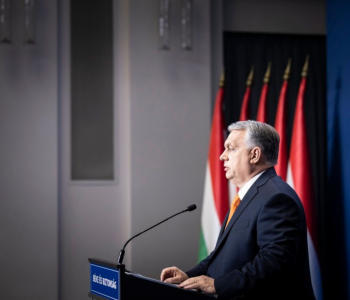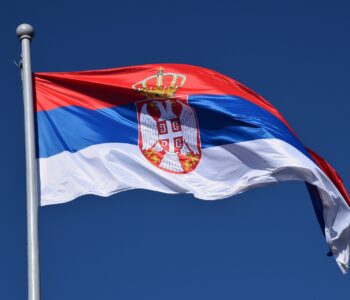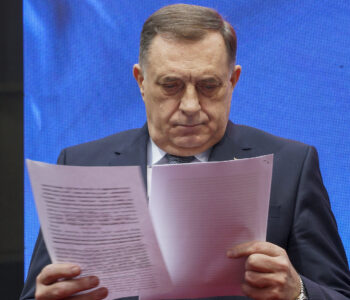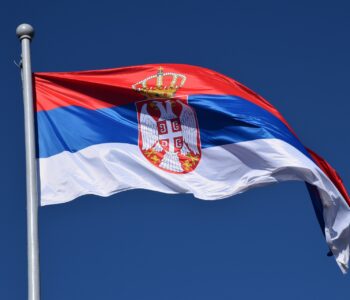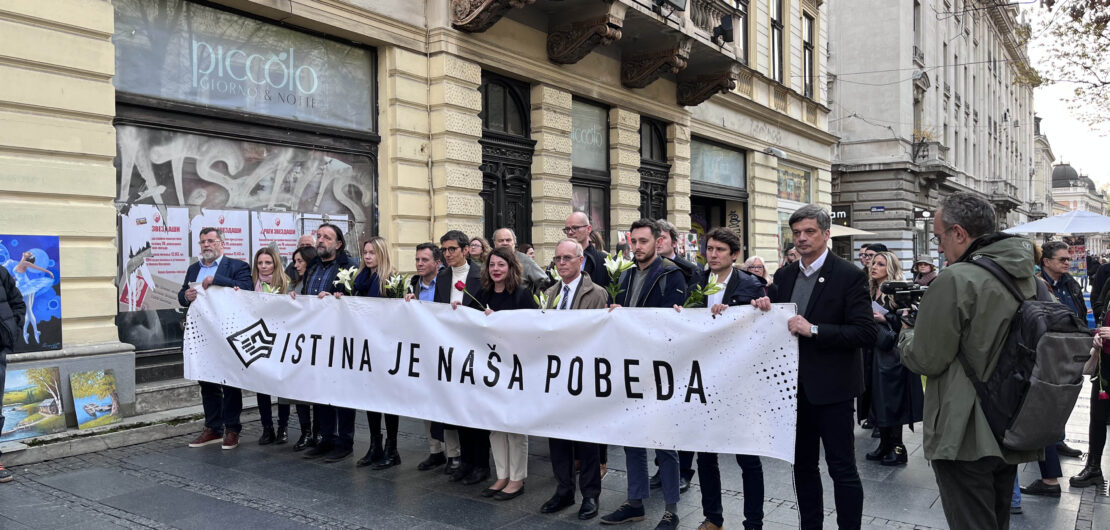 Allgemein
Allgemein
Serbia: MFRR media freedom mission to visit Belgrade and…
Serbia: MFRR media freedom mission to visit Belgrade and Novi Sad
The partners organisation of the Media Freedom Rapid Response (MFRR) will conduct a mission to Serbia between 7-9 April to meet with journalists, media stakeholders and law enforcement authorities amidst a rapidly worsening media freedom crisis.
28 March 2025
During the three-day visit, the delegation will travel to Belgrade and Novi Sad to meet with journalists, editors, media outlets, journalist associations and civil society groups to gather information about the serious spike in pressure on independent journalism and media freedom by state authorities and government officials.
The mission has sought meetings with officials from the State Prosecutor’s Office and the Serbian Police, as well as representatives from the European Union office in Belgrade (EU), the Council of Europe (COE), and the Organisation for Security and Cooperation (OSCE).
The visit comes as independent media and those covering ongoing nationwide anti-corruption protests face an increasingly dangerous climate of attacks, harassment, death threats, smears from leading public officials, as well as legal threats, and ongoing regulatory and financial pressure.
Since the beginning of protests in November 2024 following the Novi Sad station tragedy, Mapping Media Freedom (MMF), the largest platform in Europe for documenting attacks on journalism and media, which is run by the MFRR, has recorded 66 violations of media freedom and different attacks on journalists.
The mission will be led by the European Federation of Journalists (EFJ) and joined by representatives from ARTICLE 19 Europe, the European Centre for Press and Media Freedom (ECPMF), Free Press Unlimited (FPU), the International Press Institute (IPI) and OBC Transeuropa (OBCT). It is being coordinated with support from the Independent Journalists’ Association of Serbia (NUNS).
The partner organisations of the MFRR last jointly visited Serbia in 2023 to attend events marking the anniversary of the murder of Serbian editor Slavko Curuvija in 1999. An MFRR fact-finding mission to Serbia was also carried out in 2021.
A mission report with key findings and recommendations will be published by MFRR partners following the visit and provided to EU authorities.
The delegation will also be holding press conferences with both Belgrade and Novi Sad. For more information, or to schedule interviews, please email mfrr@ecpmf.eu
Recent MFRR advocacy on Serbia:
Serbia: One year of unpunished attacks on journalist Dinko Gruhonjić
Serbia: Urgent call stop targeting and intimidating journalists
Serbia: Media independence is an exception rather than the rule
Serbia: Independent journalism faces its biggest crisis in years
Srbija: Misija za slobodu medija MFRR u poseti Beogradu i Novom Sadu
Partnerske organizacije platforme Media Freedom Rapid Response (MFRR) će sprovesti misiju u Srbiji između 7. i 9. aprila tokom koje će se sastati sa novinarima, medijskim interesnim grupama i organima za sprovođenje zakona usred sve veće krize slobode medija.
Tokom trodnevne posete delegacija će boraviti u Beogradu i Novom Sadu gde će se sastati sa novinarima, urednicima, medijskim kućama, novinarskim udruženjima i organizacijama civilnog društva kako bi prikupila informacije o ozbiljnom porastu pritisaka na nezavisno novinarstvo i slobodu medija od strane državnih organa i službenika.
Misija je takođe tražila sastanak sa zvaničnicima Republičkog javnog tužilaštva i policije, kao i sa predstavnicima kancelarije Evropske unije u Beogradu (EU) i Organizacije za bezbednost i saradnju (OEBS).
Poseta dolazi u trenutku kada se nezavisni mediji i oni koji izveštavaju o aktuelnim protestima protiv korupcije širom zemlje suočavaju sa sve opasnijom atmosferom napada, uznemiravanja, pretnji smrću, kleveta koje dolaze od visokih državnih funkcionera, kao i pravnih pretnji i kontinuiranih regulatornih i finansijskih pritisaka.
Od početka protesta u novembru 2024. nakon tragedije na stanici u Novom Sadu, Mapping Media Freedom (MMF), najveća platforma u Evropi za dokumentovanje napada na novinare i medije, koju vodi MFRR, zabeležila je 66 slučajeva kršenja slobode medija i raznih napada na novinare.
Misiju će predvoditi Evropska federacija novinara (EFJ), uz učešće predstavnika ARTICLE 19 Europe, Evropskog centra za slobodu štampe i medija (ECPMF), Free Press Unlimited (FPU), Međunarodnog instituta za štampu (IPI) i OBC Transeuropa (OBCT). Koordinira se uz podršku Nezavisnog udruženja novinara Srbije (NUNS).
Partnerske organizacije platforme MFRR poslednji put su zajedno posetile Srbiju 2023. godine kako bi prisustvovale događajima povodom obeležavanja godišnjice ubistva srpskog novinara Slavka Ćuruvije 1999. godine. Mreža MFRR je 2021. godine u Srbiji obavila misiju za procenu stanja slobode medija.
Nakon posete partneri MFRR-a objaviće izveštaj sa najvažnijim zaključcima i preporukama, koji će potom biti dostavljen zvaničnicima Evropske unije.
Delegacija će takođe održati konferencije za štampu u Beogradu i Novom Sadu. Za više informacija i zakazivanje intervjua pišite na e-mail adresu mfrr@ecpmf.eu
Nedavne akcije MFRR-a vezane za Srbiju:
Serbia: One year of unpunished attacks on journalist Dinko Gruhonjić
Serbia: Urgent call stop targeting and intimidating journalists
Serbia: Media independence is an exception rather than the rule
Serbia: Independent journalism faces its biggest crisis in years




